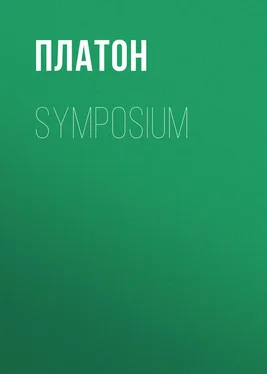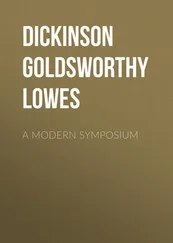Платон - Symposium
Здесь есть возможность читать онлайн «Платон - Symposium» — ознакомительный отрывок электронной книги совершенно бесплатно, а после прочтения отрывка купить полную версию. В некоторых случаях можно слушать аудио, скачать через торрент в формате fb2 и присутствует краткое содержание. Жанр: Философия, foreign_antique, foreign_prose, на английском языке. Описание произведения, (предисловие) а так же отзывы посетителей доступны на портале библиотеки ЛибКат.
- Название:Symposium
- Автор:
- Жанр:
- Год:неизвестен
- ISBN:нет данных
- Рейтинг книги:5 / 5. Голосов: 1
-
Избранное:Добавить в избранное
- Отзывы:
-
Ваша оценка:
- 100
- 1
- 2
- 3
- 4
- 5
Symposium: краткое содержание, описание и аннотация
Предлагаем к чтению аннотацию, описание, краткое содержание или предисловие (зависит от того, что написал сам автор книги «Symposium»). Если вы не нашли необходимую информацию о книге — напишите в комментариях, мы постараемся отыскать её.
Symposium — читать онлайн ознакомительный отрывок
Ниже представлен текст книги, разбитый по страницам. Система сохранения места последней прочитанной страницы, позволяет с удобством читать онлайн бесплатно книгу «Symposium», без необходимости каждый раз заново искать на чём Вы остановились. Поставьте закладку, и сможете в любой момент перейти на страницу, на которой закончили чтение.
Интервал:
Закладка:
There is a similar harmony or disagreement in the course of the seasons and in the relations of moist and dry, hot and cold, hoar frost and blight; and diseases of all sorts spring from the excesses or disorders of the element of love. The knowledge of these elements of love and discord in the heavenly bodies is termed astronomy, in the relations of men towards gods and parents is called divination. For divination is the peacemaker of gods and men, and works by a knowledge of the tendencies of merely human loves to piety and impiety. Such is the power of love; and that love which is just and temperate has the greatest power, and is the source of all our happiness and friendship with the gods and with one another. I dare say that I have omitted to mention many things which you, Aristophanes, may supply, as I perceive that you are cured of the hiccough.
Aristophanes is the next speaker: —
He professes to open a new vein of discourse, in which he begins by treating of the origin of human nature. The sexes were originally three, men, women, and the union of the two; and they were made round – having four hands, four feet, two faces on a round neck, and the rest to correspond. Terrible was their strength and swiftness; and they were essaying to scale heaven and attack the gods. Doubt reigned in the celestial councils; the gods were divided between the desire of quelling the pride of man and the fear of losing the sacrifices. At last Zeus hit upon an expedient. Let us cut them in two, he said; then they will only have half their strength, and we shall have twice as many sacrifices. He spake, and split them as you might split an egg with an hair; and when this was done, he told Apollo to give their faces a twist and re-arrange their persons, taking out the wrinkles and tying the skin in a knot about the navel. The two halves went about looking for one another, and were ready to die of hunger in one another's arms. Then Zeus invented an adjustment of the sexes, which enabled them to marry and go their way to the business of life. Now the characters of men differ accordingly as they are derived from the original man or the original woman, or the original man-woman. Those who come from the man-woman are lascivious and adulterous; those who come from the woman form female attachments; those who are a section of the male follow the male and embrace him, and in him all their desires centre. The pair are inseparable and live together in pure and manly affection; yet they cannot tell what they want of one another. But if Hephaestus were to come to them with his instruments and propose that they should be melted into one and remain one here and hereafter, they would acknowledge that this was the very expression of their want. For love is the desire of the whole, and the pursuit of the whole is called love. There was a time when the two sexes were only one, but now God has halved them, – much as the Lacedaemonians have cut up the Arcadians, – and if they do not behave themselves he will divide them again, and they will hop about with half a nose and face in basso relievo. Wherefore let us exhort all men to piety, that we may obtain the goods of which love is the author, and be reconciled to God, and find our own true loves, which rarely happens in this world. And now I must beg you not to suppose that I am alluding to Pausanias and Agathon (compare Protag.), for my words refer to all mankind everywhere.
Some raillery ensues first between Aristophanes and Eryximachus, and then between Agathon, who fears a few select friends more than any number of spectators at the theatre, and Socrates, who is disposed to begin an argument. This is speedily repressed by Phaedrus, who reminds the disputants of their tribute to the god. Agathon's speech follows: —
He will speak of the god first and then of his gifts: He is the fairest and blessedest and best of the gods, and also the youngest, having had no existence in the old days of Iapetus and Cronos when the gods were at war. The things that were done then were done of necessity and not of love. For love is young and dwells in soft places, – not like Ate in Homer, walking on the skulls of men, but in their hearts and souls, which are soft enough. He is all flexibility and grace, and his habitation is among the flowers, and he cannot do or suffer wrong; for all men serve and obey him of their own free will, and where there is love there is obedience, and where obedience, there is justice; for none can be wronged of his own free will. And he is temperate as well as just, for he is the ruler of the desires, and if he rules them he must be temperate. Also he is courageous, for he is the conqueror of the lord of war. And he is wise too; for he is a poet, and the author of poesy in others. He created the animals; he is the inventor of the arts; all the gods are his subjects; he is the fairest and best himself, and the cause of what is fairest and best in others; he makes men to be of one mind at a banquet, filling them with affection and emptying them of disaffection; the pilot, helper, defender, saviour of men, in whose footsteps let every man follow, chanting a strain of love. Such is the discourse, half playful, half serious, which I dedicate to the god.
The turn of Socrates comes next. He begins by remarking satirically that he has not understood the terms of the original agreement, for he fancied that they meant to speak the true praises of love, but now he finds that they only say what is good of him, whether true or false. He begs to be absolved from speaking falsely, but he is willing to speak the truth, and proposes to begin by questioning Agathon. The result of his questions may be summed up as follows: —
Love is of something, and that which love desires is not that which love is or has; for no man desires that which he is or has. And love is of the beautiful, and therefore has not the beautiful. And the beautiful is the good, and therefore, in wanting and desiring the beautiful, love also wants and desires the good. Socrates professes to have asked the same questions and to have obtained the same answers from Diotima, a wise woman of Mantinea, who, like Agathon, had spoken first of love and then of his works. Socrates, like Agathon, had told her that Love is a mighty god and also fair, and she had shown him in return that Love was neither, but in a mean between fair and foul, good and evil, and not a god at all, but only a great demon or intermediate power (compare the speech of Eryximachus) who conveys to the gods the prayers of men, and to men the commands of the gods.
Socrates asks: Who are his father and mother? To this Diotima replies that he is the son of Plenty and Poverty, and partakes of the nature of both, and is full and starved by turns. Like his mother he is poor and squalid, lying on mats at doors (compare the speech of Pausanias); like his father he is bold and strong, and full of arts and resources. Further, he is in a mean between ignorance and knowledge: – in this he resembles the philosopher who is also in a mean between the wise and the ignorant. Such is the nature of Love, who is not to be confused with the beloved.
But Love desires the beautiful; and then arises the question, What does he desire of the beautiful? He desires, of course, the possession of the beautiful; – but what is given by that? For the beautiful let us substitute the good, and we have no difficulty in seeing the possession of the good to be happiness, and Love to be the desire of happiness, although the meaning of the word has been too often confined to one kind of love. And Love desires not only the good, but the everlasting possession of the good. Why then is there all this flutter and excitement about love? Because all men and women at a certain age are desirous of bringing to the birth. And love is not of beauty only, but of birth in beauty; this is the principle of immortality in a mortal creature. When beauty approaches, then the conceiving power is benign and diffuse; when foulness, she is averted and morose.
Читать дальшеИнтервал:
Закладка:
Похожие книги на «Symposium»
Представляем Вашему вниманию похожие книги на «Symposium» списком для выбора. Мы отобрали схожую по названию и смыслу литературу в надежде предоставить читателям больше вариантов отыскать новые, интересные, ещё непрочитанные произведения.
Обсуждение, отзывы о книге «Symposium» и просто собственные мнения читателей. Оставьте ваши комментарии, напишите, что Вы думаете о произведении, его смысле или главных героях. Укажите что конкретно понравилось, а что нет, и почему Вы так считаете.











